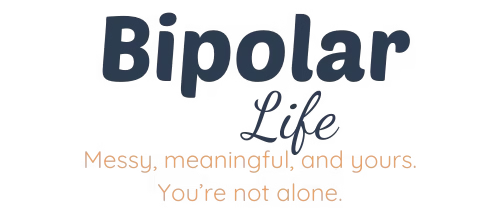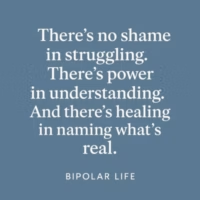Mental Health Is Health: Finding Strength in a Bipolar Diagnosis
There’s No Shame in Seeking Help
Mental health is often misunderstood, and that misunderstanding can be dangerous. For many people—myself included—that confusion can lead to years of misdiagnosis or inadequate care. Bipolar disorder, in particular, is frequently mistaken for depression, anxiety, or even personality issues. And when you’re struggling and don’t yet have answers, it’s easy to internalize the wrong messages: I’m just too emotional. I should be able to handle this. Something’s wrong with me.
But the truth is, needing support for your mental well-being isn’t weakness—it’s wisdom. Just like we treat a sinus infection or a sprained ankle, we deserve to care for our minds with the same respect and urgency.
For many years, I kept my bipolar disorder private. It was something only my family really knew. I worried about what others might think. Would they judge me? Would they see me differently? Even within my own family, there were moments of judgment, confusion, or silence—so how could I expect the world to respond with compassion? But the longer I live with bipolar, the more I’ve come to understand that honesty is healing—and that there is no shame in having a mental illness.
“Bipolar disorder doesn’t define me—it refines me. It gives me depth, insight, and resilience.”
The Shift from Silence to Honesty
Living with bipolar isn’t easy. The highs can be euphoric, and the lows can feel endless. Medication can help, but it’s not a cure—and for many of us, it’s not always effective or easy to get right. Finding the right treatment plan is often a long, frustrating process. It can take months—or even years—of trial and error to figure out what works, and even then, stability can be fragile. For a long time, I tried to manage quietly, wearing a mask of normalcy. But silence has a cost. It isolates us.
Eventually, I began to speak up—to trusted friends, to my community, and now through writing. That choice to be open didn’t just change how others saw me—it changed how I saw myself. I felt stronger, more stable, and more in control—more connected to myself.
Why honesty matters:
- It builds empathy in others.
- It breaks stigma.
- It invites support.
Seeing Bipolar as a Gift
This may sound surprising, but I’ve come to see my bipolar disorder as a kind of gift. Not in the “toxic positivity” way—but in the real, raw way that recognizes how deeply this condition has shaped me.
It has taught me:
- To notice life’s smallest joys.
- To cherish moments of peace.
- To build deeper compassion—for myself and others.
God didn’t make a mistake with me. My brain may work differently, but different doesn’t mean broken. It means unique.
For Those Walking This Path (Or Loving Someone Who Is)
If you’re living with bipolar disorder—or loving someone who is—know this: you are not alone. There is no perfect formula for balance, but there is hope. There is strength in your story, and healing in community.
Some tips I’ve learned:
- Talk about it. When you’re ready, your story could help someone else.
- Find a care team you trust—therapists, doctors, friends.
- Track your moods and triggers.
- Build routines that support your energy and rest.
We’re All Human, and We’re All Healing
Bipolar disorder is part of my story, but it’s not the whole story. It doesn’t make me less than—it makes me me. And I believe that sharing my journey can help others find their way to stability, hope, and peace.
Whether you’re navigating this condition yourself or standing beside someone who is, remember: mental health is health. And we all deserve care, dignity, and love.
Survive the lows. Ride the highs. Hold space in between. And know this: you’re not alone.- Ann


